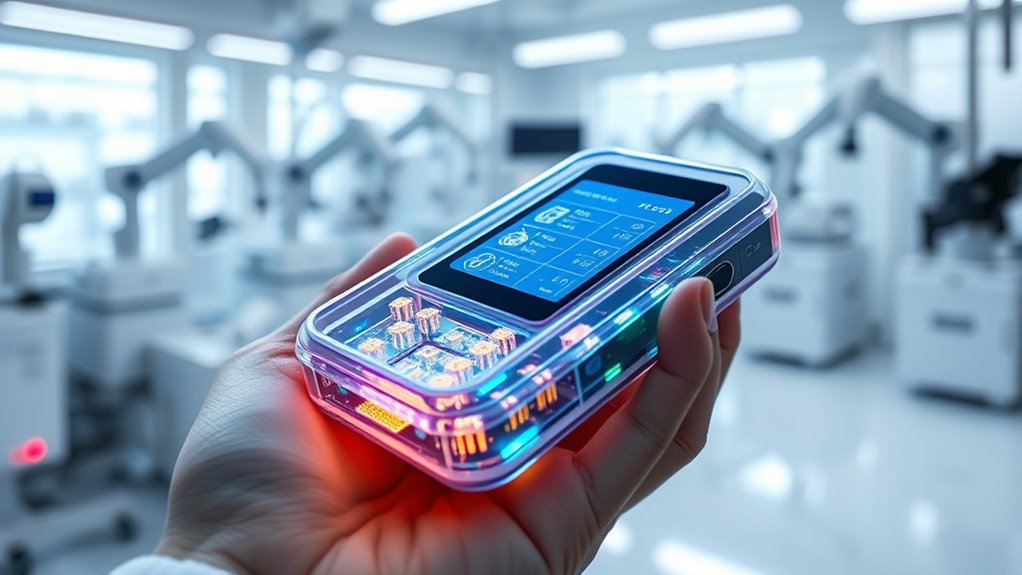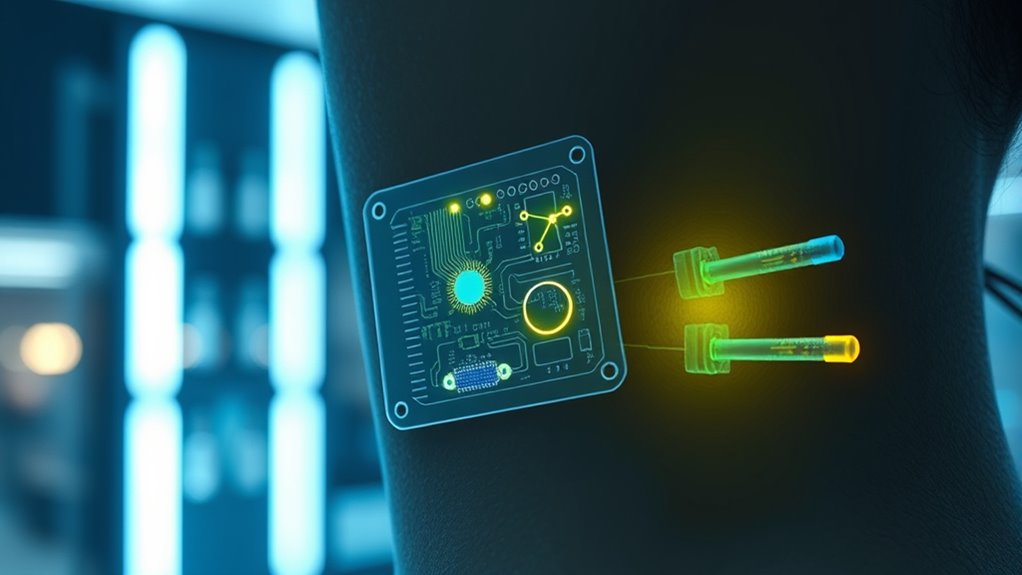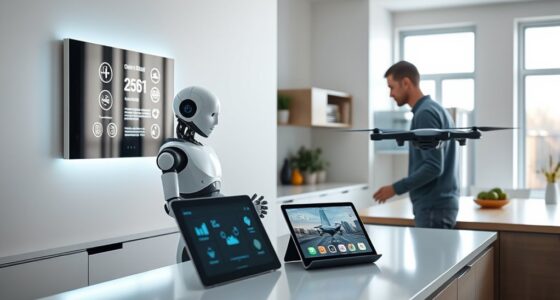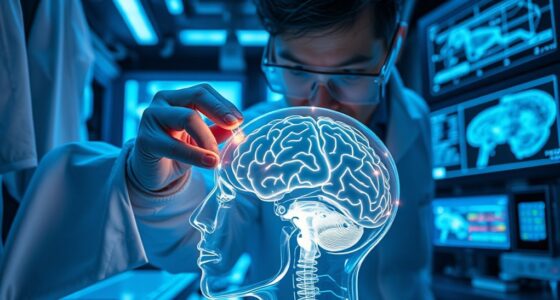Autonomous biochemical sensing will transform your healthcare by providing continuous, real-time monitoring of essential signs and biochemical markers without manual effort. This means you’ll get early alerts for health issues, allowing for faster, more personalized treatments. These devices can interpret data independently and adapt to your unique health patterns, shifting care from reactive to proactive. As this technology advances, you’ll experience more seamless health management—discover how these innovations can shape your future well-being.
Key Takeaways
- Enables continuous, real-time health monitoring for early detection and proactive management of health conditions.
- Automates data analysis using AI, providing personalized insights and reducing reliance on manual interpretation.
- Facilitates early warning systems, preventing complications and decreasing hospital admissions.
- Integrates seamlessly with electronic health records, enhancing healthcare delivery and decision-making.
- Empowers individuals with proactive health insights, reducing unnecessary interventions and healthcare costs.

Have you ever wondered how healthcare is evolving to become more proactive and personalized? The answer lies in emerging technologies like autonomous biochemical sensing, which are revolutionizing how we detect and manage health conditions. These advancements are making it possible to continuously monitor your health in real time, giving you immediate insights and enabling early intervention before symptoms even appear. At the heart of this transformation are wearable diagnostics—compact, non-invasive devices that track vital signs, biochemical markers, and other health indicators around the clock. Unlike traditional tests that require visits to a clinic, wearable diagnostics provide seamless, ongoing data collection, empowering you to take control of your health from home.
With real-time monitoring, these devices constantly analyze your bodily functions, identifying anomalies or changes that might signal an emerging health issue. For example, a wearable sensor could detect fluctuations in glucose levels for diabetics or monitor electrolyte balance for athletes, alerting you instantly if something’s off. This immediate feedback allows for swift action, whether that means adjusting medication, hydration, or consulting with your healthcare provider. The autonomous nature of these systems means they operate independently, interpreting data and flagging concerns without needing manual input. This reduces the burden on healthcare professionals and minimizes delays in diagnosis or treatment.
Real-time analysis of bodily functions enables swift responses and reduces delays in healthcare interventions.
Furthermore, autonomous biochemical sensing leverages advanced algorithms and AI to interpret complex data patterns, providing personalized health insights tailored specifically to you. As these devices learn your baseline health metrics, they become more accurate at detecting deviations, ensuring that you’re only alerted when truly necessary. This precision reduces false alarms and unnecessary interventions, making healthcare more efficient and less invasive. Over time, the data collected can also contribute to broader research efforts, helping scientists understand disease progression and develop better treatments. For you, this means a future where your health is continuously optimized through real-time insights and personalized interventions.
The integration of wearable diagnostics and autonomous sensing is also paving the way for predictive healthcare. Instead of waiting for symptoms or lab results, you could receive alerts about potential health risks before they develop into serious conditions. This proactive approach helps prevent complications, reduces hospital visits, and improves overall outcomes. As technology advances, these autonomous systems will become even more sophisticated, seamlessly integrating with other health devices and electronic records. For you, this means a future where healthcare is no longer reactive but anticipatory, giving you the confidence that your health is being monitored and managed proactively, every moment of every day. Additionally, the development of best dog training guides and other resources is exemplifying how expert advice can be integrated into broader health and wellness strategies, emphasizing the importance of continual learning and adaptation.
Frequently Asked Questions
How Secure Is Autonomous Biochemical Data Transmission?
You’re right to wonder about security. Autonomous biochemical data transmission uses encryption and secure protocols to protect your data privacy. However, vulnerabilities can arise if sensors aren’t properly calibrated or if updates aren’t managed well. Regular sensor calibration is vital to prevent errors or breaches. Overall, when manufacturers implement strong security measures and maintain calibration, your biochemical data stays secure during transmission.
Can Sensors Detect Rare or Unexpected Biomarkers?
You can rely on advanced sensors to detect rare or unexpected biomarkers, thanks to ongoing biomarker discovery and sophisticated sensor calibration. These innovations help sensors recognize subtle signals, much like tuning an instrument to catch every note. As a result, your healthcare can benefit from early detection of unusual conditions, ensuring timely intervention. This progress makes biochemical sensing more sensitive and accurate, opening new frontiers in personalized medicine.
What Are the Costs of Deploying Autonomous Biochemical Sensors?
You’ll find that the costs of deploying autonomous biochemical sensors vary based on technology, scale, and integration needs. A thorough cost analysis reveals significant upfront investments, including device manufacturing and data infrastructure. Deployment challenges like ensuring sensor accuracy, managing maintenance, and addressing data security can add to expenses. However, long-term benefits like early detection and personalized care often outweigh initial costs, making these sensors a valuable healthcare investment.
How Do Sensors Adapt to Individual Patient Differences?
You adapt sensors to individual differences by constantly calibrating them to each patient, like tuning a musical instrument. Personalization challenges include accounting for unique biochemistry and environmental factors, which require advanced algorithms. These sensors update their settings automatically, guaranteeing accurate readings over time. By doing so, you guarantee the device remains reliable, overcoming variability and providing tailored healthcare that’s as precise as a tailor-made suit.
What Are the Ethical Considerations of Autonomous Health Monitoring?
You should consider privacy concerns and informed consent when using autonomous health monitoring. These devices collect sensitive data, so you need to make certain your personal information stays secure and that you’re fully aware of what’s being monitored and how it’s used. It’s essential to have clear consent processes, so you’re informed about any risks and your rights, helping protect your autonomy and privacy in this evolving healthcare landscape.
Conclusion
As you embrace autonomous biochemical sensing, healthcare will become more proactive and personalized. Imagine devices that detect health issues before symptoms appear—reducing hospital visits and saving lives. In fact, studies show that early detection can improve treatment outcomes by up to 70%. By harnessing this technology, you’ll experience faster diagnoses, better management of chronic conditions, and a future where your health is monitored seamlessly and continuously. The revolution in healthcare is just beginning—are you ready to be part of it?









